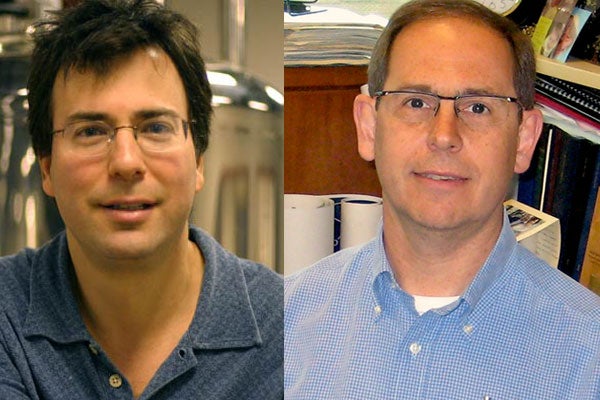
Changing the way we look at molecules
Published: June 4, 2012
They work with tiny molecules but they are giants in their fields, renowned for path-breaking research and inspired teaching.
Now, Professor Lewis Kay and Professor Mark Lautens also hold the title of University Professor, the highest honour awarded to a University of Toronto faculty member.
“The university is delighted to recognize the outstanding contributions of Professor Kay and Professor Lautens,” said Vice-President and Provost Cheryl Misak, “These internationally renowned scholars have profoundly influenced science around the world and students here at U of T.”
Kay is a world leader in the development and application of nuclear magnetic resonance (NMR) methods for the study of protein structure and dynamics. Lautens is renowned for his discovery of chemical reactions that simplify the way complex molecules can be made and his development of innovative strategies and tactics to prepare medicinally important compounds.
A Canadian, Kay obtained his PhD in Molecular Biophysics from Yale University in 1988, with post-doctoral studies at the National Institutes of Health. In 1992, he joined U of T as Assistant Professor in the departments of molecular genetics and biochemistry in the Faculty of Medicine, becoming a full professor with tenure just three years later. His early work revolutionized the NMR field that had been limited to the study of small proteins at the time and these early papers are now citation classics. He has continued to make major contributions to the development of NMR methods, breaking the “size barrier” many times.
A former Alfred P. Sloan Fellow and an International Scholar of the Howard Hughes Medical Institute, Kay won the Merck Frosst Award in 1996, for the top biochemist in Canada within 10 years of a first faculty appointment and in 1998 he was recognized as one of Canada’s “Top 40 Under 40”. Over the years, he has received the Steacie Prize from the National Research Council of Canada, the Favelle Medal from the Royal Society of Canada, the Founders Medal from the International Society of Magnetic Resonance in Biological Systems, and the Gunther Laukien Prize.
In 2006 Professor Kay was elected to the Royal Society of Canada and in 2010 to the Royal Society (London).
Lautens’ research focuses on finding new ways to prepare medicinally important molecules in an efficient and environmentally sustainable manner and to seek new reactivity patterns that expand on the chemist’s toolbox in organic synthesis – one of the most important branches of organic chemistry. He has developed many reactions that create “chiral molecules” needed for drug discovery and found new strategies to synthesize molecules used in medicinal chemistry – leading contributions to the field which industry has adopted.
A Canadian, Lautens conducted his doctoral studies at the University of Wisconsin-Madison with post-doctoral studies at Harvard University on the synthesis of bryostatin, a potent anti-cancer agent. He joined U of T in 1987 as an NSERC University Research Fellow and Assistant Professor, becoming a Professor in 1995. Since 1998 he has held an Endowed Chair, the AstraZeneca Professor of Organic Synthesis, and in 2003 he was named an NSERC/Merck Frosst Industrial Research Chair in New Medicinal Agents via Catalytic Reactions.
Lautens’ awards include: the A.P. Sloan Fellowship; E.W.R. Steacie Fellowship; A.C. Cope Scholar from the ACS; Eli Lilly Grantee; Pedler Award of the RSC (UK); A. Bader, R. Lemieux, Merck Frosst Awards all from the CSC. Elected Fellow of the Royal Society of Canada and Fellow of the Royal Society of Chemistry (UK), Lautens has held visiting professorships in Geneva, Paris, a Max Planck Institute (MPI) in Mulheim, Marburg, ICIQ Tarragona, Santiago de Compostela, Tokyo Institute of Technology and at the Corbella School in Italy. He was selected for an Alexander von Humboldt Award and his host institutions are the Freie University of Berlin, Aachen and Goettingen.
More than 150 graduate students and postdoctoral fellows have studied in Lautens’ laboratory along with hundreds of undergraduates and visiting students from Denmark, Japan, Ireland, France, Spain, Germany and the UK. His former students hold academic positions in Canada, the US, France, Japan and the UK and many have taken positions in the pharmaceutical industry in countries around the world.
“Professor Lautens and Professor Kay are two of the world's finest chemists," Misak said. “Our students are extraordinarily fortunate to be taught by and to work with them.”



